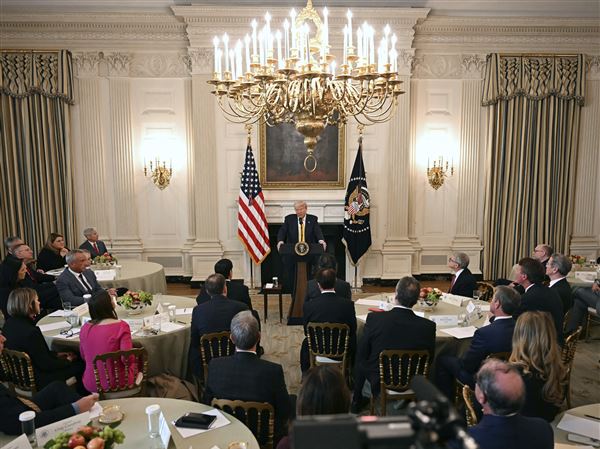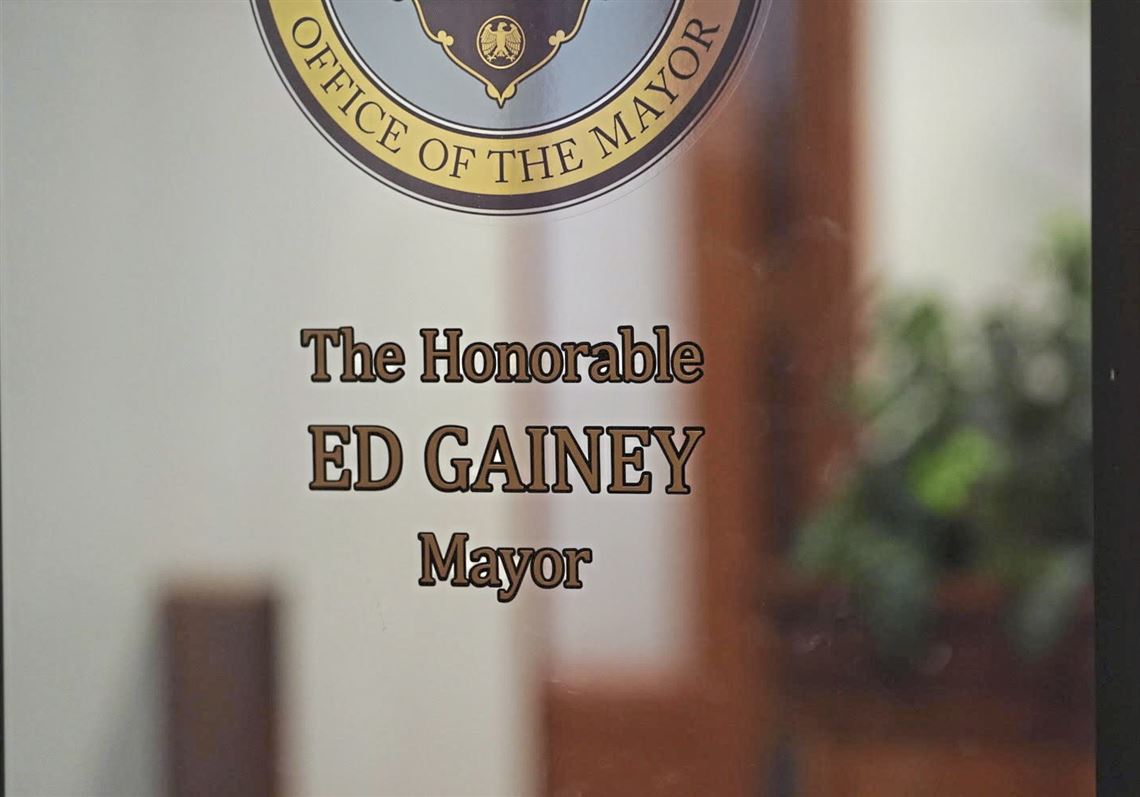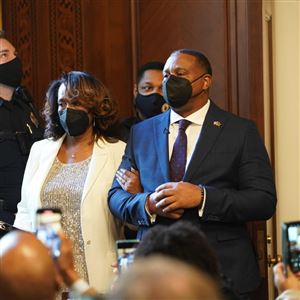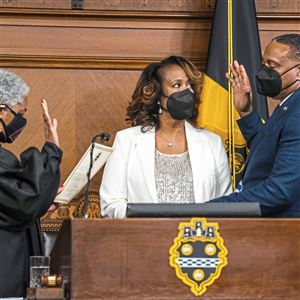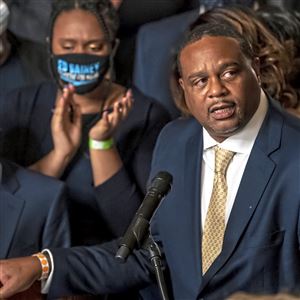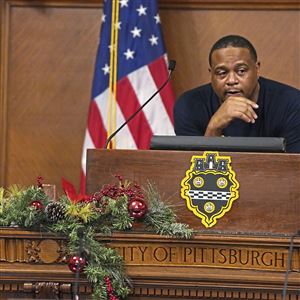During a virtual ceremony broadcast from City Council Chambers, Ed Gainey was sworn in as the 61st mayor of Pittsburgh. Mr. Gainey’s three living predecessors — Tom Murphy, Luke Ravenstahl and Bill Peduto — were in attendance.
Allegheny County Executive Rich Fitzgerald had many kind words to say about the new mayor despite having thrown his support behind Mr. Peduto during the primary. “For all the great things that are happening in this city,” Mr. Fitzgerald said in a very stirring speech, “not everyone has that hope.”
Mr. Fitzgerald picked up on a key theme from Mr. Gainey’s stump speeches during the primary and the election season about making Pittsburgh “a city for all.”
Speaking remotely from Harrisburg, Gov. Tom Wolf sent his congratulations and assured everyone that Mr. Gainey was someone who knew and understood how Harrisburg operates and that he would find eager partners for Pittsburgh down the turnpike.
For Black folks watching the inauguration of the city’s first African American mayor in real time on social media and various platforms, there was something surreal — in a good way — about the whole thing.
Judge Kim Berkeley Clark, who administered the oath of office, alluded to it several times as her voice cracked from the emotion of the moment. This inauguration wasn’t something anyone who has been around here for very long ever expected to see.
This has always been a town where ascension to high office depended more on tribal intrigues and backroom maneuverings inscrutable to outsiders than it did to merit. The mayor’s office seemed to be the province of warring political families. Outsiders like Mr. Gainey were million-to-one long shots.
Though her voice was muffled as she said it, the mask didn’t mitigate the bluntness of Judge Clark’s advice to the man she was swearing in. “You are a public servant,” she said earnestly. “Hold yourself accountable to the taxpayers…”
There was an eruption of “amens” in the chat stream of the Facebook page carrying the ceremony. I half expected Mayor Gainey himself to shout “yes ma’am” in response to the judge’s admonition.
Judge Clark rounded up her comments with encouragement to the new mayor to be empathetic, patient and kind and to surround himself with people he could trust. She was especially adamant that he take time to learn the names and faces of everyone around him so he could tap into the institutional knowledge he would need to be a great public servant.
“I will never take your support for granted,” Mr. Gainey said when it was his time to speak. Removing his mask and projecting a strong, confident voice, he thanked his wife, Michelle, their children and the mother who raised him and his brother for providing him with the work ethic he needed to succeed.
He also thanked his father who sat in the gallery on his big day for being someone worthy of being a role model. It was typical of the magnanimity Mr. Gainey is known for expressing. It is also an indication that whatever past difficulties there may have been, only the present moment and what folks choose to do moving forward matter.
It really was a terrific speech delivered with the confidence of a preacher and a practiced orator.
Artist Vanessa German, who delivered a beautiful poem that began with the line “justice begins in the human heart” had set the stage for Mr. Gainey’s own flights of literary fancy minutes later.
“Our real power is not to change the world,” Mr. Gainey said in that aspirational voice he has used to such good effect for years, “but to make a world of change in the people we meet every day.”
Once again he reminded his audience that he understands what his mandate is — “make Pittsburgh the city you voted for.”
He spoke of economic inclusion, making the police partners in communities where they are shunned, working to make the schools first rate, reforming public transit, infrastructure, strong job creation, helping small businesses and “building the next generation of Pittsburghers.”
He promised to be aggressive on the part of ordinary residents, principled and “always on the side of the people.” He finished on his familiar refrain to “represent every resident of the city” — for those who voted for him and those who didn’t.
He then injected a note of sobriety in his checklist of promises. “I can’t do it alone,” he said. “If someone comes to you saying I, I, I, they’re a liar. It’s [about] what we can do.”
Because it was staring everyone in the face, Mr. Gainey acknowledged the historic importance of his election as the first Black mayor in Pittsburgh’s history. The realization seemed to humble him. He is a man who could have easily become just another statistic, but he defied the odds spectacularly. He knows there is no precedent for a Gainey mayorship in Pittsburgh, yet there he stood with his left hand on a Bible held by his wife, Michelle.
It was a wonderful ceremony, even if muted by the absence of the crowd that surely would’ve made it the most raucous inauguration in city history had we not been in the middle of a pandemic.
We got a sense of what is to come from Mr. Gainey’s speech, including the way he pronounces the town’s name as “Picksburgh.” I believe he’s the first mayor in modern times to pronounce it this way, but it is this kind of realness that will endear him to thousands of people who have never seen themselves reflected in that office. It could also portend the beginning of a progressive era “that doesn’t come at the expense of anyone being left behind,” he shouted at one point.
So many promises in such a short time, but there is no doubt that Mayor Ed Gainey, the 61st mayor of Pittsburgh, meant every word. “Pittsburgh, let’s go get it,” he said as the chamber exploded with applause. It’s a promising beginning to a new era.
Tony Norman: tnorman@post-gazette.com or 412-263-1631. Twitter @Tony_NormanPG.
First Published: January 3, 2022, 11:09 p.m.
Updated: January 4, 2022, 12:21 a.m.



